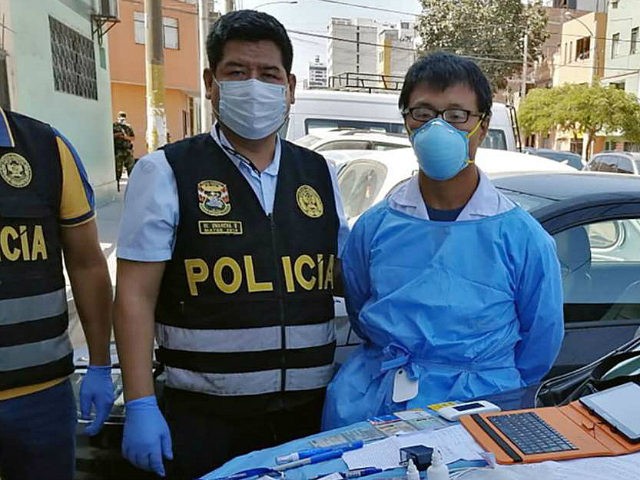Police in Lima arrested a Chinese citizen for illegally conducting rapid coronavirus tests on the public with testing kits stolen from Peru’s health ministry, Singapore’s CNA reported on Monday.
Zhang Tianxing, 36, was arrested on Sunday in the Brena district of Lima as he was about to take test samples from two women at the entrance of their house, police said. He was allegedly “proceeding to carry out rapid tests for COVID-19 [Wuhan coronavirus] that he had stolen” from his employer, the Lima Sur health authority.
Zhang was allegedly charging the women to conduct the test.
“When questioned, he acknowledged he was not authorized to carry out this rapid test and that the Rapid Diagnostic Tests had been stolen from the Directorate of Integrated Health Network of Lima Sur where he had worked,” the police said.
Zhang confessed to stealing the tests to profit on administering them privately, according to police. Authorities found a backpack with 25 coronavirus tests and other medical supplies at his home.
President Martin Vizcarra said on Wednesday that 330,000 rapid coronavirus test kits had arrived in Peru and were distributed throughout the country. Peru had carried out 45,272 rapid coronavirus tests as of April 12, according to the country’s health ministry.
Last December, Peru and the United States entered the final stages of talks on a deal to promote U.S. investments in the South American nation as part of Washington’s initiative to counter Chinese influence in the region.
In 2018, the United States launched its “Growth in the Americas” initiative to promote private-sector investments in energy and infrastructure in Latin America. This came as a direct response to China’s invitation for Latin American countries to join its global Belt and Road Initiative (BRI). The BRI aims to establish China’s influence across Asia, Africa, and Europe (and, to a lesser extent, Latin America) through exploitative infrastructure projects.
Last April, Peru announced plans to join the initiative despite warnings at the time from U.S. Secretary of State, Mike Pompeo. On April 12, while on a state visit to South America, Pompeo cautioned against China’s BRI infrastructure investments, which he described as “predatory” lending practices. At the time, President Vizcarra insisted Peru’s relationship with Washington would remain strong.
On March 16, Chinese diplomats lashed out at the Peruvian Nobel Laureate Mario Vargas Llosa, calling him “extremely irresponsible” for criticizing China’s initial handling of the Wuhan coronavirus outbreak and labeling him prejudiced for stating that the virus originated in China.
In a column for the Spanish newspaper El País on March 14, Vargas Llosa wrote that the coronavirus “originated in China” and that because of the pandemic it caused, society was now showing signs of returning to the Middle Ages when people lived in fear of the plague. Vargas Llosa asserted that this is a direct result of China’s undemocratic political system, which, he points out, silenced doctors who tried to warn of the initial virus outbreak. This cost the world valuable time that could have been used to prepare for the virus and to develop a vaccine, Llosa argues. He adds that China’s actions in downplaying the severity of the coronavirus outbreak were the hallmarks of a dictatorship, comparing the events to that of Chernobyl.
The Wuhan coronavirus originated in Wuhan, China, late last year. On March 11, the World Health Organization (WHO) designated the outbreak a pandemic. At press time on Monday, the Wuhan coronavirus was responsible for at least 1,905,935 infections 118,623 deaths worldwide.
Also at press time on Monday, Peru had 7,519 infections and 193 deaths from the Wuhan coronavirus.

COMMENTS
Please let us know if you're having issues with commenting.